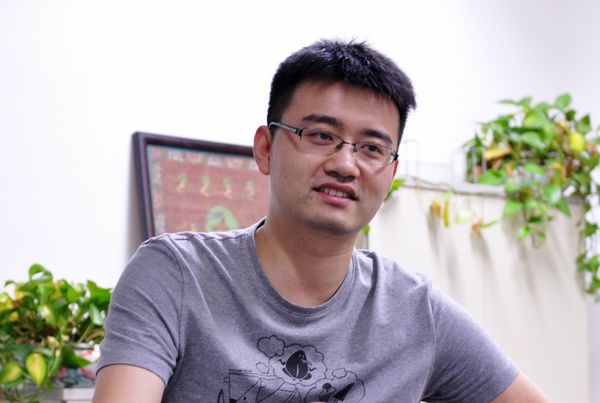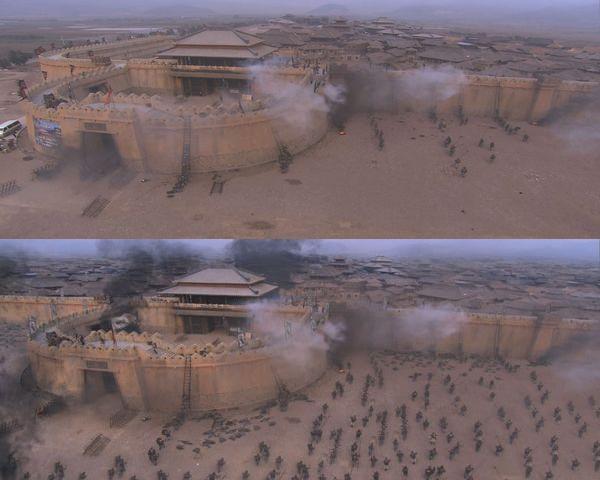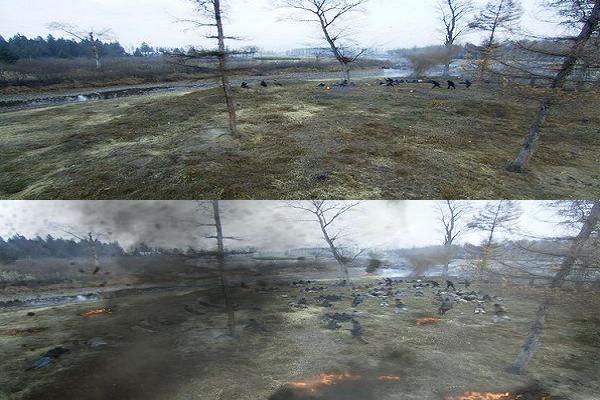A man and his dream to visualize the impossible
- By Zhang Junmian
 0 Comment(s)
0 Comment(s) Print
Print E-mail China.org.cn, July 13, 2012
E-mail China.org.cn, July 13, 2012
When 28-year-old Shi Xin opened his special effects studio in Beijing in late 2008, he was uncertain as to what the future held. At certain points afterwards, he also contemplated leaving the industry due to incessant pressures.
|
|
|
Shi Xin founded his special effects studio Aten Works with the aim of setting new standards in Chinese special and visual effects. [Photo by Li Xiaohua/China.org.cn] |
Shi's company, Aten Works, has now built an incredibly good word-of-mouth reputation within the industry with its know-how and experience accumulated through working on more than 60 films and TV drama series.
Shi said: "We help filmmakers and TV drama directors to visualize scenes from ancient times or the future, and scenes which are impossible to produce with traditional shooting methods, through a combination of 3D animation, real photography and computer graphics."
He continued: "We create spectacular special effects and incredible stunts, such as avalanches, explosions, storms, smoke, clouds, fires and monsters."
Shi's team particularly excels in group and crowd animation, a technique used to simulate the behavior of real-life crowds of people, animals or other beings to create grand and striking life-like scenes.
|
|
|
A special effect shot for the Chinese historical epic drama, The Qin Empire II, a 51-episode blockbuster involving the post-production of numerous war and battle scenes. [File Photo] |
Shi clearly recalled his company's first project, which was the trailer for New 4th Army Women Soldiers. The shoot placed great emphasis on the realistic recreation of battle scenes, which required impressive effects to enhance the stories. "We endured the test from our client on the post-production of special effect shots totaling about 15 minutes in length," he said. "Since then, we have gradually built up our fame."
Recently, Shi's company has created the imaginative landscapes, action sequences and other special effects for more than 10 TV series to be aired on China's central TV and local satellite TV channels. These projects include more than 1,000 special effect shots for the Chinese historical epic drama, The Qin Empire II, a 51-episode blockbuster involving the post-production of numerous war and battle scenes. The series, produced by Shaanxi-based Chin Empire Film and TV Investment with a total investment of more than 100 million yuan (US$15.9 million), is directed by renowned Chinese director Ding Hei.
Shi said that Beijing-based Hairun Film & TV Production, the largest private film and TV company in China, as well as Zhejiang-based Talent International Media, are two of Aten Works' major clients. "We have established sound cooperation with quite a few famous Chinese directors, including Ding Hei and An Jian," he said.
|
|
|
A special effect shot for Brave Journey to Northeast China (2009). Aten Works has undertaken the special effects production for some of the country's most popular TV dramas such as the 30-episode military-themed New 4th Army Women Soldiers (2009) and the 55-episode historical series, Brave Journey to Northeast China. [File Photo] |
Having formerly rented a shabby farmer's house as his working place, Shi's Aten Works is now headquartered at the first floor underground of an office building in northern Beijing, and his team has expanded from a mere 4 employees, including himself, to more than 20. "We work underground as we don't need to face the audience, and the rental is much cheaper than the suites above the ground, but it still costs the company more than 300,000 yuan (US$47,600) a year," Shi said. "Another reason for us to stay here is that many studios engaged in post-production are clustered in this area, which is adjacent to the Beijing Film Studio, one of the three major film producing bases in China."
Recalling how he entered the special effects industry, Shi said: "I grew up in a family with close ties to the film and TV industry, and was personally interested in the subject. My grandma, Zhao Yuan, is a well-established film director, and my grandpa, Zhu Jinming, was a highly-reputed photographer and director." Nevertheless, Shi stated this didn't help him much, as it's an industry which places more emphasis on personal capabilities, pioneering spirit and perseverance.
Talking about his long-term development plan, Shi said that he dreams of becoming the industry leader in the future, but admits there is still a long way to go. "I will try my best, no matter what is ahead. Enthusiasm and perseverance are two of my greatest strengths," Shi stated, adding that he hoped to cooperate with foreign firms.
Shi is also interested in making movies and his company is currently completing its very first micro film called Last Day, a story about a couple's break up, featuring some time and space change shots with special effects.
|
|
|
A special effect shot by Aten Works [File Photo] |
It's commonly recognized that China is something of a latecomer to digital visual effects and the majority of Chinese blockbusters would hire overseas teams to produce more sophisticated special effects. There is therefore an urgent need to focus more on strengthening the country's R&D capabilities in this field.
Looking toward solutions for these problems, Shi said: "To solve these problems, the film and TV industry should allocate more money to, and leave more time for, the post-production segment. We also hope that the Chinese audience can be more tolerant and supportive of China's special effects industry." He also indicated that the government needs to introduce more preferential policies in effective enforcement to support the industry's further development.
He added: "We should also be involved more from the very beginning, even in the scriptwriting phase, as is the practice in the West, since visual effects are also integral to pre-production. In this way it will become possible to produce better visual effects, and avoid wasting time and money."
Shi hopes that the association with post-production could be developed, as he believes that this last link, one of the most important and indispensable parts of film and TV projects, is generally neglected by domestic producers. "Our association, if developed, could help us to draw up industry standards to regulate and protect the industry's development."










Go to Forum >>0 Comment(s)